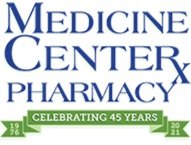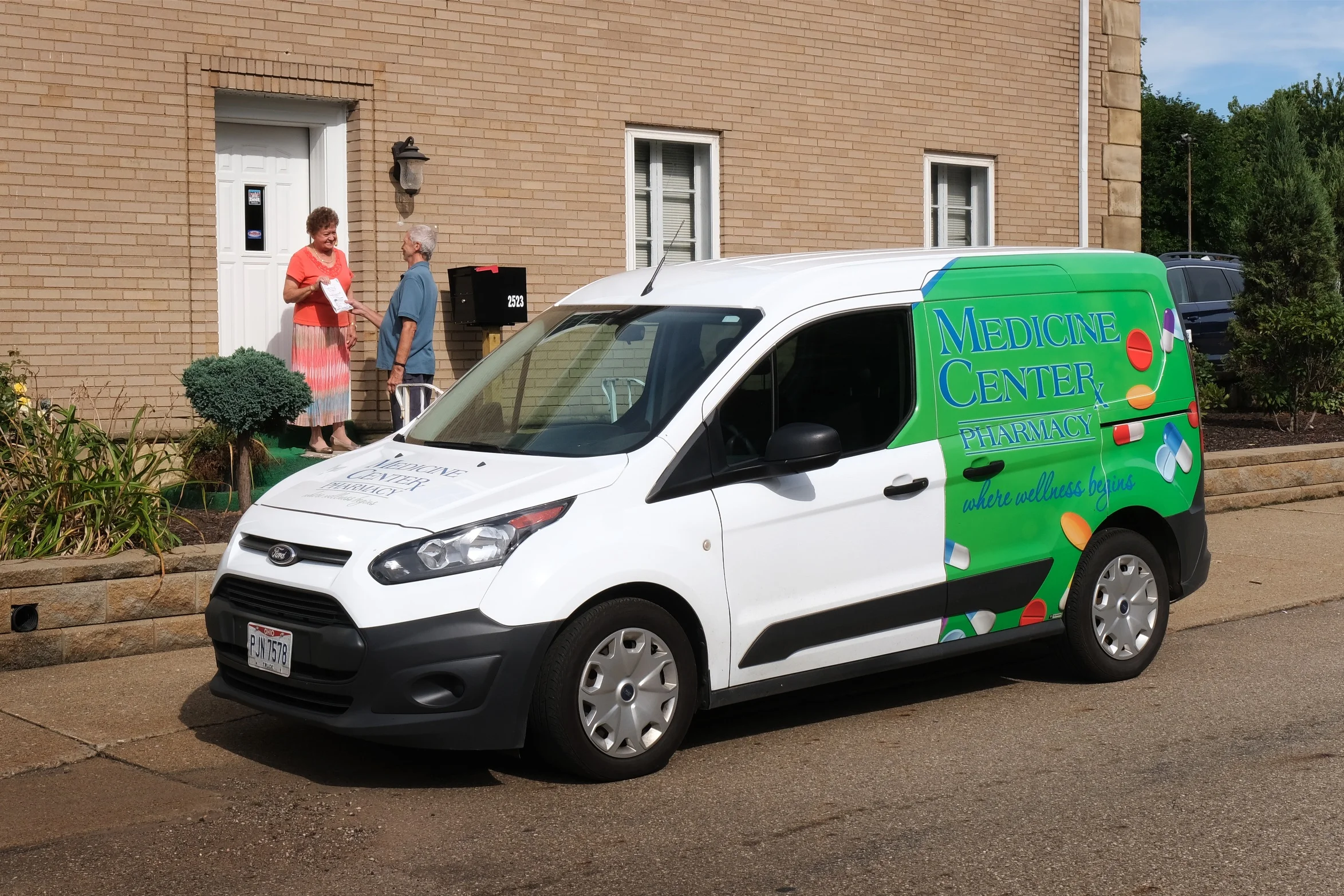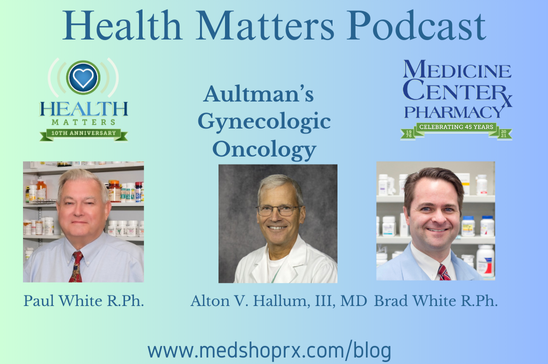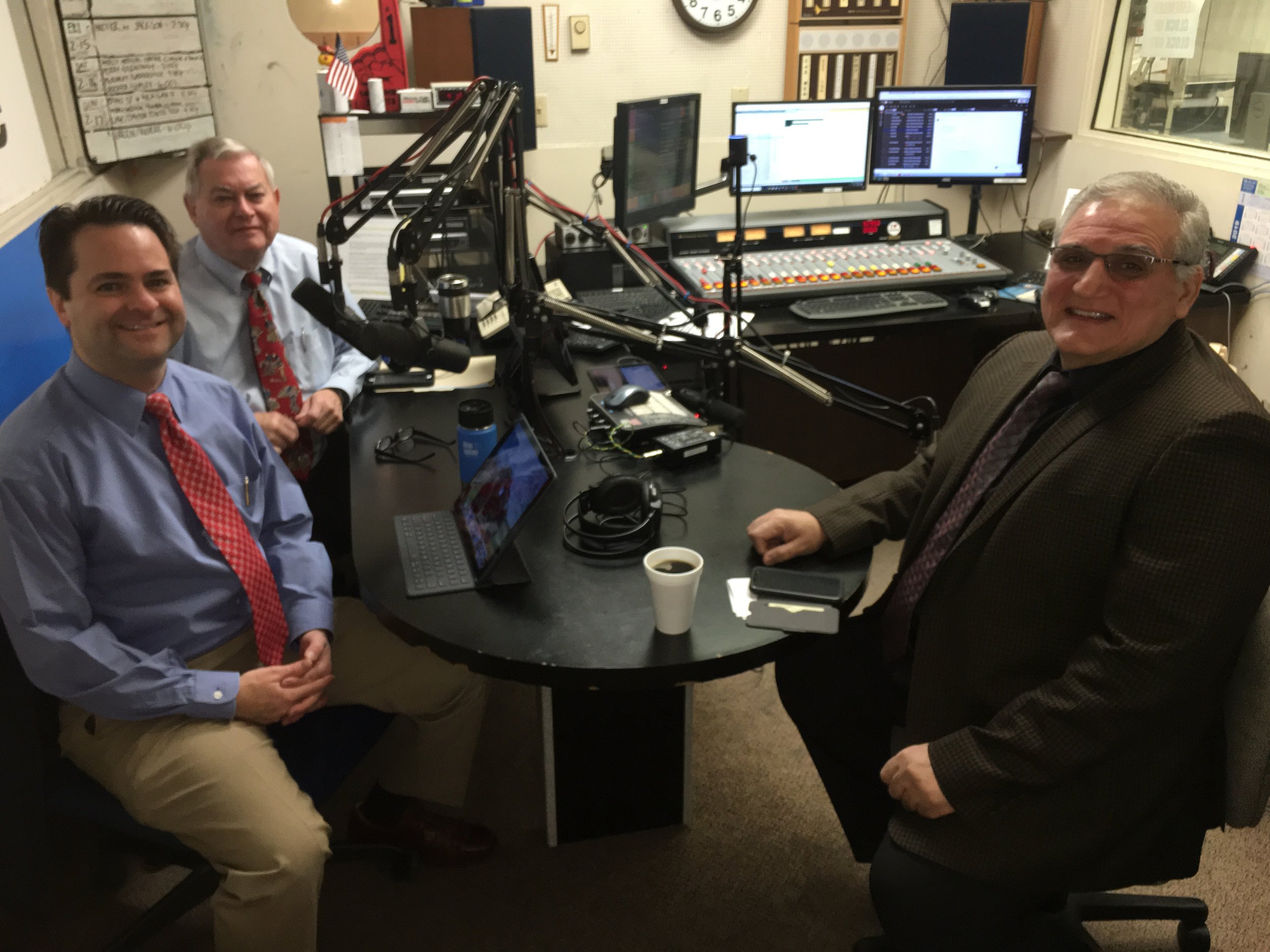Licensed in three states: Ohio, Indiana, and Iowa. [01:47]
Medical Training
I went to medical school in Chicago, University of Chicago, and then did my surgical training at Johns Hopkins. I took a couple of years off to do research at the NIH (National Institutes of Health), which were close by, and then I went to Ann Arbor, in Michigan, for a couple of years to do cardiac surgery training, and I also had an interest in heart surgery for children. So, I spent a year at the Children's Hospital of Philadelphia, and actually a good part of my career was also doing children as well as adults. [01:51]
So, I am one, of the group of four cardiothoracic surgeons. My partner, who was here a few weeks ago, Dr. D'Agostino, focuses more on lungs and other non-cardiac issues, he also does heart surgery, and the other three surgeons, myself included, focus primarily on diseases of the heart and the blood vessels within the chest. [02:31]
Why Did You Come to Stark County?
Well, initially, I came because of the job. I had been in Toledo for a period of time and I got a call saying that they needed a temporary position, so-called locum tenens position, to come to Canton, and I had never been the Canton before and I said, “Well, you know, it's the Hall of Fame. Let's go check it out.” So, I came. I was actually staying at a hotel along 77 for the first three or four weeks that I was here, and when I got to Altman, it just seemed like a very natural fit as far as the people that I work with the cardiologists, and the overall hospital, I think the quality of care, the support that we have as physicians are excellent, and I really enjoyed the patient population here and they seem to like me, so it was kind of a natural thing. [03:36]
What Age Group of Patients do you Treat?
Currently, I treat adult patients. I'm certainly comfortable doing older children or young adults, having spent a lot of my career doing that, but most of our focus really is adult patients that would be 50 and older just given the population that is most affected by heart disease in this country. [05:30]
Where Would the Young Children be Treated for Heart Issues?
Well, in Stark County, they really have a variety of places: Children's and Akron would be, obviously, one. If people wanted to travel further, they could go to Cleveland or Columbus, which also have good children's hospitals. [06:00]
What is AFib?
So, let's talk about a normal heart rhythm to start. The heart has a very nice electrical system that coordinates the heartbeat, which starts with the upper chambers contracting first, before the lower chambers or ventricles do, and it's only a split second different but it makes a difference in terms of cardiac function and overall health. What happens is that as you get older, more and more patients have irregularities of that atrial heartbeat, and the “A” in AFib is for atrial. So, instead of having a coordinated heartbeat, the upper chambers of the heart can start beating irregularly. When you actually look at it in an open chest, a patient with AFib, it almost looks like a bag of worms; it's not a nice coordinated heartbeat, it's very irregular. Some patients can feel it immediately, others don't even know that they have it. AFib can lead to heart failure and clots forming within the upper chambers of the heart, and those, if they ever break off and leave the heart, can lead to strokes and other problems.
This is predominantly a problem that becomes more manifest as you get older. So, under 40, it's rather rare, but between 40 and 65, the incidence is a little bit over 2%, and then it starts to rise over 65, and once you're in your 80s, you get to nearly at 10% incidence. And that coordinated contraction between the upper and lower chambers really helps with cardiac output and then. obviously, increases the risk of stroke and other problems. [06:37]
Is There any Relationship Between AFib and a Murmur?
There can be. Indeed, certain valve problems predispose patients to AFib, such as a mitral valve problem which stretches the upper chambers of the heart and that stretching can lead to an increased incidence of AFib as well. [09:00]
Treatment Options for AFib
If you're first diagnosed with AFib, the immediate treatment is: One, make sure that the heart rate is controlled, and then if you see a cardiologist, for instance, they're going to try and convert you back to a normal rhythm. There are a couple of ways to do that, one would be with medication, and the other option is with electricity or electroshock; what would be called cardioversion. Now, that is not as exciting as you might see, imagine from watching TV shows, but if your doctor decides to do a cardioversion on you, you'd be brought into the hospital, you'd have some brief sedation. So, you would be out for a few seconds or minutes while they shock you, and hopefully, at the end of that session, you would go back into a normal heart rhythm. There’s certainly the possibility you could go back into AFib again, but most of the time, they're going to load you with some medications before the shock to try and keep you in a normal rhythm afterwards. [12:32]
Success Rate
Long term success rate for all treatments is probably around 60%. Now, it really depends on whether you have what's known as paroxysmal AFib, where you have brief runs or bursts of AFib; that is a little easier to treat with a higher success rate to chronic, almost permanent, AFib which is much harder to treat. And certainly, the cardioversion is, and the medicines are one spectrum, least invasive way of doing this. If, for instance, you continue to have problems with AFib, depending on your cardiologist, and your electrophysiologist or EP doctor, they may want to consider you for something known as ablation, in which they run some special tubes and wires up through your groin into your heart, and then using different types of energy, either what's known as cryoablation or radiofrequency ablation they can try and get you back into a normal rhythm. [14:05]
Are Women More Likely To Be Affected By Heart Disease Than Men?
Up to probably menopause, women are somewhat less likely to be affected than men. It seems that that is somewhat protective, especially against coronary artery disease, compared to men. But then, once women go through menopause, within 5 to 10 years after that they seem to catch up with men in terms of the incidence of atherosclerosis and coronary artery disease. [17:39]
Are You At Risk?
Coronary artery disease and heart disease is so prevalent within the United States and really, we used to say within the United States and Western world, but now, as the standard of living rises throughout the world, you're seeing a huge amount of heart disease. Even in developing countries like China and India. So, I don't know exactly what it is; it may be that you know that as we get older, some of this is just a natural progression of disease that we probably wouldn't have seen if we had been dying at 50. [18:40]
Aging and Scientific Advancements
As medicine gets better or more advanced, we're dealing more with acute problems that may have arisen early on, especially infections; those, by and large, have been taken care of and now we're dealing more with chronic problems that come with aging. So, the increasing incidence of heart disease and cancer and things like that tend to happen to people who are older, and as the population ages we're seeing more of that. [19:40]
The Watchman Procedure
So, the watchman procedure is indeed for patients with atrial fibrillation. So, as we discussed earlier in the hour, patients with atrial fibrillation are at risk for having strokes, and other embolic events; meaning having blood clots break off from inside the heart and be ejected out into the bloodstream where it can really go anywhere within the body. The area from which has the most common sight for blood clot formation is called the left atrial appendage, which is a little wind-sock type protrusion from the from the left atrium, and it's a little pocket that just sits there, it's probably like the appendix in your belly, there's probably no good reason for it to be there, but it does collect blood and when you're an angel fibrillation, that blood can become static within there and clot off.
So, one way to deal with that, obviously is with blood thinners, if you continue to have problems, you can have what's known as a watchman procedure, which is relatively new within the last five years or so. You could come in, have it done; usually, you can go home by the next day. [23:38]
Latest Developments
Well, watchman is one. There are other interesting and new devices that have been developed over the last 10 years or so. The most prominent one is something for the aortic valve; as patients get older, some of them develop murmurs. And one of the more common murmurs that you can have is from something known as aortic stenosis. The aortic valve is the valve that opens and closes when your heart squeezes and allows blood to eject out of the left ventricle. [26:09]
Certainly, a fair number of patients as they get older, that valve can narrow, causing the heart to work harder. If you think about it, as it starts to narrow, the heart has to work harder and harder. It's kind of like weightlifting for the heart is what I tell my patients, because the heart has to squeeze even harder to get through a narrow hole. Weightlifting might be good for your biceps, but it's not good for the heart because it makes the heart thicker; it makes it stiffer, and as it gets thicker it requires more coronary blood flow. What usually happens in this day and age is that as this aortic stenosis gets worse and worse, and by the way, it never gets better, it only gets worse, you begin to have symptoms. [26:51]
What are the Symptoms of Aortic Stenosis?
You might start to have shortness of breath; you might start to have exercise intolerance or fatigue. Certainly, in older patients, often when you're talking to them, you have to kind of tease this out. One of the questions I always ask patients is, “Are you taking more naps than you used to?” And it's surprising patients who say, “I'm perfectly fine, doc. I don't have any problems,” you start to ask them, “Are you taking more naps than you did two or three years ago?” And they say, “Hey, you know, you're right. Yeah, I'm taking more naps.” So, once this aortic stenosis becomes severe, you need to do something about it. And this new technique is placement of an aortic valve without open heart surgery. [27:53]
Valve Replacement
The acronym is TAVR for Transcatheter Aortic Valve Replacement, and the studies that have been done both in the US and in Europe, suggest that TAVR is an excellent substitute for open heart surgery, certainly, for high and moderate risk patients and lower risk patients. I'm not sure that the evidence is quite clear which one is better. But certainly, for patients that previously might not have had anything done because they were 85 and frail, can now have a TAVR procedure done where their aortic valve is essentially replaced. You can come-in in the morning, have it done, and potentially leave by the next day. [28:45]
Advancements in Heart Valve Replacement
Well, one of the things we talked about was the TAVR procedure which has been really revolutionary, and treatment of aortic stenosis. The other thing, not quite as revolutionary, if you will, is the mitral valve, there's another valve in the heart; those two are the most commonly repaired ones: the aortic valve and the mitral valve. We are repairing a lot of mitral valves now instead of replacing them for the right situations and we’ve become better and better at doing that. And for certain types of mitral valve disease, we can tell our patient, “Hey, there's a 95-100% chance you can keep your valve rather than replacing it.”
Now, if we have to replace it, there’s a couple of different scenarios, depending on the age of the patient and their lifestyle choices. People talk about pig valves and they talk about metal valves as a general. [32:42]
If you're doing a TAVR, meaning you're putting the valve up through the groin, for the aortic valve, you don't actually take the valve out. If you're doing open surgery, you might, and often do, take the old valve out because when you look at it, it's become like a rock, really, inside it's full of calcium that needs to be debrided to put a new valve in. [34:02]
Pig Valves vs Metal Valves
What's known as pig or bioprosthetic valves, the nice thing about those are: you don't need to have any long-term blood thinners for those valves, because they're made of biologic material, so they don't tend to have clot form on them. Unlike the mechanical valves which need to be on blood thinners for a lifetime. [34:37]
But I think the important thing here is that if you're getting a bioprosthetic: a pig or a cow, you don't need to be, at least long-term, on blood thinners. Whereas, if you're getting a mechanical valve, you do need to be on blood thinners. [35:14]
What happens in those though is that the pig, and the cow valves, or bioprosthetic valves do deteriorate over time. So, the younger you are, the faster they deteriorate. [36:01]
Facts About Heart Bypass Surgery
So, I would say that 50% to 60% of our open-heart surgical volume is heart bypass or cabbage coronary artery bypass grafting because coronary artery disease is quite common. We have patients coming in either with angina or chest pain or sometimes, after a heart attack, needing to have bypasses. So, we have in our body, two major coronary artery systems: the left and the right, it’s very simple, and they can at various places get blockages. The human body has a lot of extra capacity so that in most cases a 50% blockage does not cause angina. But once you start to get to 70% and more, it can cause problems.
If you have a single blockage, or if you're extremely high risk, a stent may be the way to go. And certainly the cardiologists or cardiology colleagues are very good at putting those in and frankly, patients would prefer a stent to open surgery. But if you have multiple blockages, and/or you're diabetic, and in certain other situations, you would, in the long term, be better off with surgery and that's been pretty well shown by multiple studies.
So, what does a bypass do? Well, using different arteries or veins from within your leg, we can bypass; get blood, pass those areas of blockage to your coronary arteries so that your heart muscle, which is the important thing, is getting adequate blood supply and it improves lifestyle because it prevents chest pain, and in certain situations, has a very good effect on your lifespan mortality as well. [40:29]
Minimally Invasive Surgery
Well, we're doing more minimally invasive surgery at Altman than we used to, and I think the other exciting thing is we are getting much better at cardiac imaging as one of our cardiologists has now become a trained, and started to do both cardiac MRI and cardiac CT. And I think when you can see more, you have more accurate ability to diagnose, and some of these tests are also rather functional, meaning you can tell where the blood is going and where it's not, and all of that information really can be critical to the proper diagnosis and treatment of patients with heart disease. [42:43]
This episode is sponsored by Mercy Medical Center and Studio Arts and Glass.



























Breast health is a vital part of overall wellness, yet many people are unsure where to turn for trusted screening, diagnosis, and ongoing care. On a recent episode of Health Matters Radio Show & Podcast, we sat down with experts from the Breast Center at Aultman Hospital to discuss best practices in breast care and the exceptional resources available right here in Canton, Ohio.